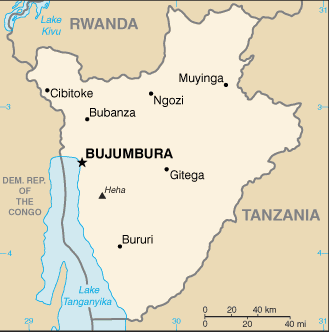Burundi, officially the Republic of Burundi, borders Rwanda to the north, the Democratic Republic of Congo to the west, and Tanzania to the south and east. It is located in the Great Lakes geographic region and is a landlocked state. Since 1966 the country has been a presidential republic and the current head of state is the president of the republic Évariste Ndayishimiye. Burundi is the second most densely populated country in Africa with approximately 470 inhabitants per square kilometre.
The country's economy is heavily dependent on the agricultural sector which, despite the extreme scarcity of arable land, employs 80% of the population. Despite the high percentage of the population employed, the agricultural sector suffers from low productivity, contributing only 40% of GDP.
Burundi has experienced a difficult economic situation over the past seven years, which has led to fiscal and balance of payments difficulties. Economic growth was estimated at 1.8% in 2021 (compared to 0.3% in 2020), supported by an easing of COVID-19 restrictions. Economic growth was 2.5% in 2022 and 3.0% in 2023. Economic growth is forecast at 3.5% in 2024, supported by gains across all sectors and infrastructure development initiatives that are beginning to bear fruit [1].
The Italian contribution
AICS currently supports an initiative in Burundi of the Territorial Entities call. The project, entitled Maison Parma, the value of the territory: the tomato supply chain and sustainable development, is carried out by the Municipality of Parma and intends to promote a supply chain approach to tomato cultivation and the establishment of a consortium for the transformation of the product.


